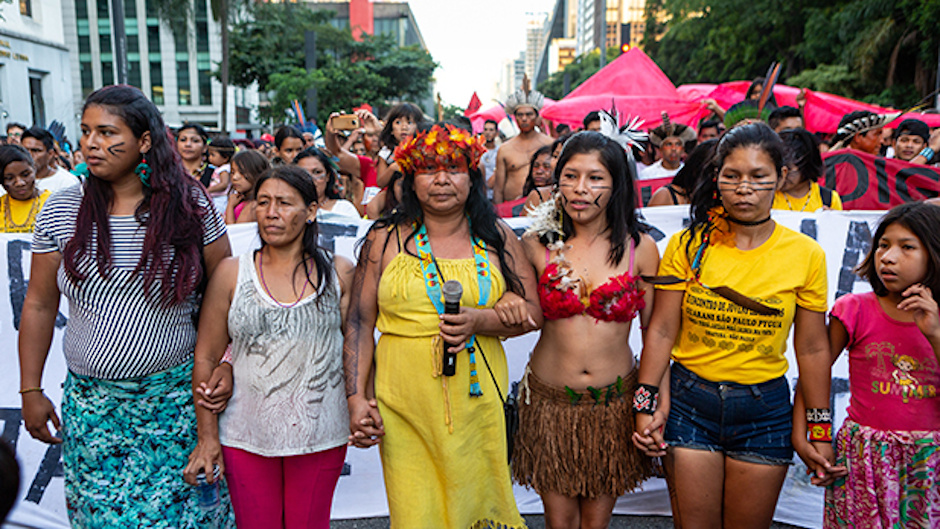Miami Law’s Human Rights Clinic worked alongside the global network of Indigenous women leaders, FIMI, and women’s rights advocacy organization, MADRE, on a submission to the U.N. Committee on the Elimination of All Forms of Discrimination Against Women. The submission seeks to inform the development of a new human rights instrument focused on the rights of Indigenous women and girls.
After years of advocacy by Indigenous women, the U.N. Committee has formally begun creating a new authoritative interpretive instrument, or General Recommendation, focused on the rights of Indigenous women and girls. The Committee takes on the task of drafting new General Recommendations every couple of years to distill its views on an issue arising from the provisions of the U.N. Convention on the Elimination of All Forms of Discrimination Against Women. Civil society has the opportunity to make submissions to inform the development of General Recommendations.
Under the supervision of Human Rights Clinic Acting Associate Director, Denisse Córdova Montes, Right to Food team students Gabriela Valentin Diaz, 3L, Mary Miller, 2L, and Abril Montero Dokser, 2L, had the opportunity to coordinate the drafting of the submission.
“This was a very rewarding and exciting experience that involved both former and current clinic students from different teams as well as Indigenous women leaders,” said Montero Dokser.
The collaborative effort resulted in a comprehensive document that detailed how different human rights should be understood in the context of Indigenous women’s and girls’ lives. The submission describes the individual and collective dimensions of rights that are especially relevant for Indigenous women, such as the rights to land, water, food, and seeds, as well as the rights to self-determination, equality, and freedom from gender-based violence, among others.
“This is a unique opportunity for the U.N. CEDAW Committee to acknowledge the pervasive and systemic problems affecting Indigenous women and girls and clarify the meaning and scope of Indigenous women’s rights,” said Córdova Montes.
The Clinic also created an advocacy brief that seeks to distill the specific demands of Indigenous women. In this document, Indigenous women asked the Committee to affirm Indigenous women’s knowledge, wisdom, and practical experience as a precondition for the full realization of their rights. Indigenous women also demanded that the Committee recognize that violations of Indigenous women’s rights are the consequence of long-standing discrimination and of an economic development model that has given rise to new forms of colonialism.
Another project team, under the supervision of the Clinic’s Acting Director, Tamar Ezer, developed a parallel submission to the CEDAW Committee on addressing gender and environmental violence against Indigenous Peoples, in collaboration with FIMI and the Cardozo Law Institute in Holocaust and Human Rights. “It was exciting to work across different project teams and contribute an in-depth analysis of human rights standards with regards to gender-based violence, environmental justice, and Indigenous sovereignty to the submission,” noted Ezer.
The submission for the new General Recommendation is only part of the Clinic’s work on the rights of Indigenous women. The Clinic’s Right to Food team has also been conducting research and preparing reports on the situation of rural and Indigenous women in Ecuador and Guatemala. The CEDAW Committee will conduct a review of Ecuador later this year and a review of Guatemala in the future, a separate process from drafting General Recommendations. The knowledge gleaned from the work in Ecuador and Guatemala has contributed to advancing the efforts to develop the new CEDAW General Recommendation of the rights of Indigenous women and girls.
Clinic students were thrilled to have had the opportunity to work collaboratively with Indigenous women leaders. "Through this process, we’ve been able to better understand the challenges, acknowledge the setbacks, and celebrate the resilience of Indigenous women and girls. We are fortunate enough to work alongside some truly inspiring Indigenous women,” said Miller.
Read more about Miami Law’s Human Rights Clinic
Read more about Miami Law’s Human Rights Law and International Law at Miami Law

